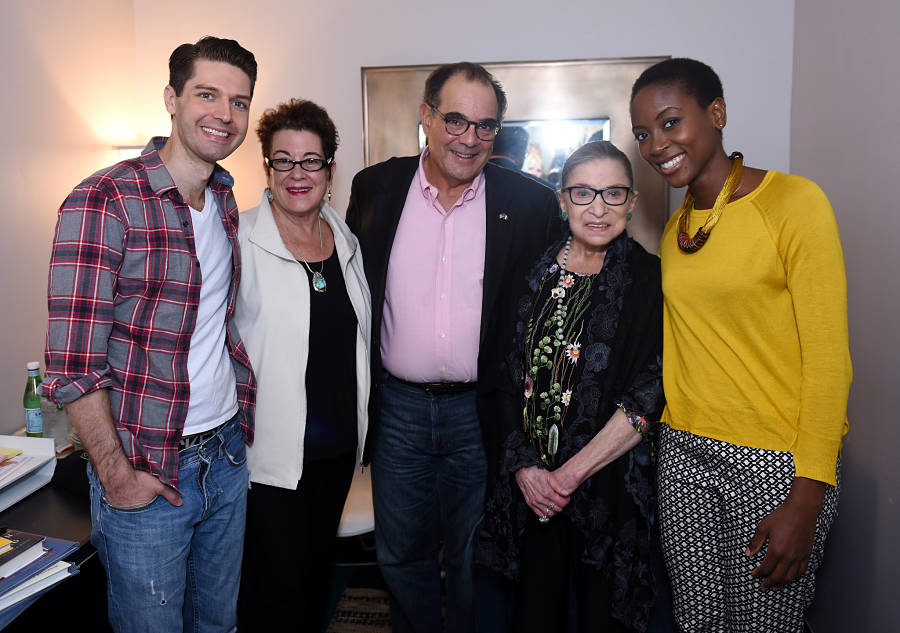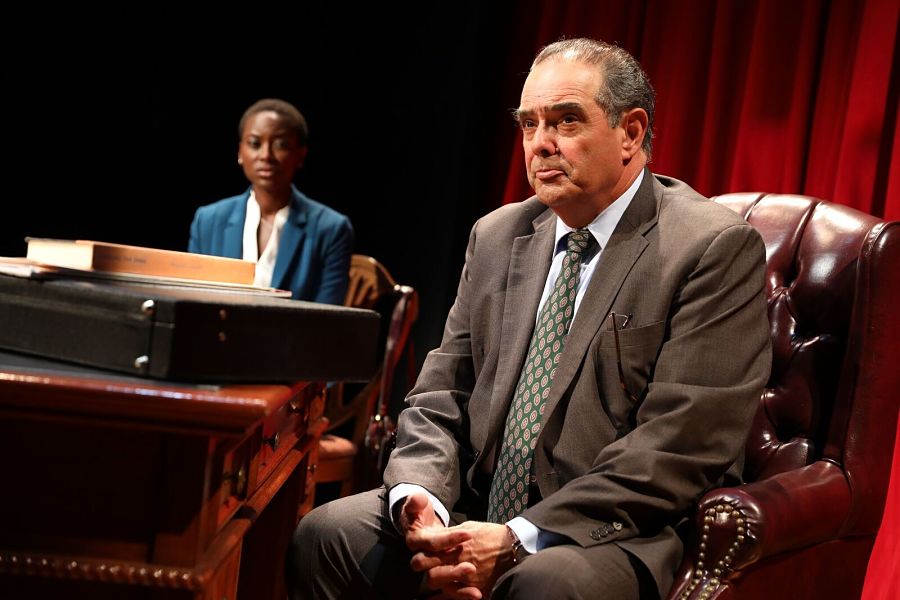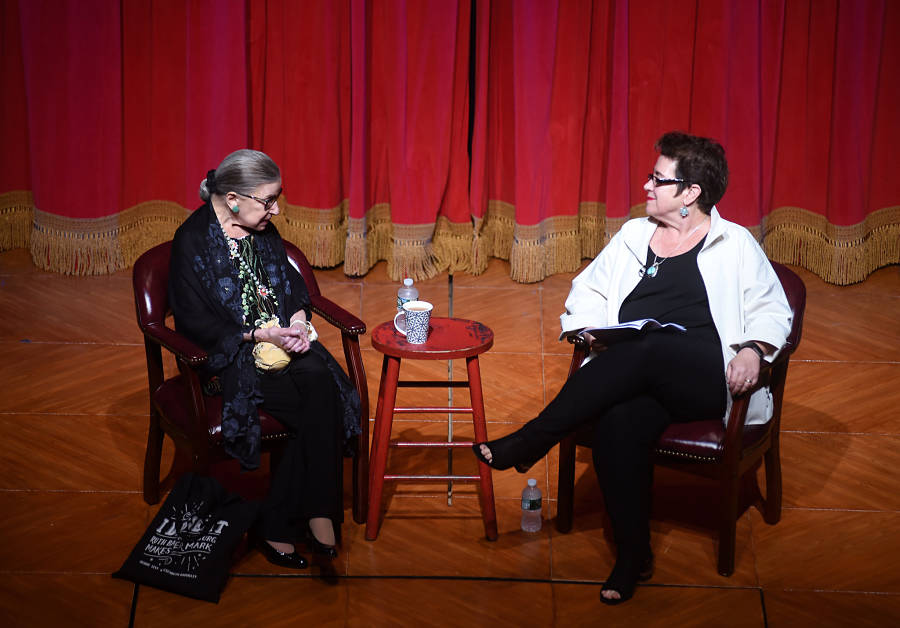There’s a moment in The Originalist, John Strand’s play about late Supreme Court Justice Antonin Scalia, when his law clerk asks, “What do you love about her?” He’s referring to his liberal sparring partner, Justice Ruth Bader Ginsburg. In that scene, Ed Gero, who plays Scalia, looks out, his eyes focused near the middle of the house, around Row F. The stage lights make it so Gero can’t see who is in those seats—but at yesterday’s Sunday matinee at New York City’s 59E59 Theaters, he knew quite well who was there. On the aisle was a Secret Service agent. Two seats over was The Originalist‘s director Molly Smith.
Between them sat Justice Ginsburg, Notorious RBG herself.
Gero wasn’t the only one who knew she was there, of course; the first time her name was mentioned nearly the entire audience swiveled their heads from the stage to her seat. Gero got to know Justice Scalia while researching the show before its first performances in 2015, and he first met Justice Ginsburg in 1996 when he played the Duke of York in Henry VI and the Justice “brought the house down” with a cameo in which she uttered the line, “First thing we do, let’s kill all the lawyers.”
Having her there added extra texture to the show, to say the least. “I’m still emotional about knowing Nino [Justice Scalia],” Gero said. “And if I bring him back to life for her, she certainly brings him back for me by being there.” (Smith told me that Ginsburg enjoyed the show and “laughed throughout.”)

Of course it was no accident that Justice Ginsburg was in the audience, nor was it her first exposure to Strand’s play; she had participated in a talkback at the Arena Stage in Washington, so Smith invited her to make a return engagement for the show’s current Off-Broadway run (through Aug. 19). The play has scheduled a wide array of talkbacks, featuring, on different occasions, playwright Strand, the cast, a Supreme Court lawyer, a former clerk for Scalia, and the president of the ACLU. But while Smith said they’ve been pleased to see that around a third to half of crowds would stay for other talkbacks, virtually no one left the house this time around. The Supreme Court, after all, feels like a secret world, and audiences are always thrilled with “a peek behind the red curtain,” Smith said, especially when it comes from someone like Ginsburg.
“This wasn’t just a talkback—this was an event,” said Gero, who sat in the audience with his two co-stars.
Justice Ginsburg received a huge standing ovation before her talk. The audience had been attentive and engaged during the show, in which the liberal law clerk (played by Tracy Ifeachor) engages in constant verbal battles with the arch-conservative Scalia, even as they each come to see the other as real humans, not just political foes. But with Ginsburg onstage, the crowd was absolutely rapt; not a whisper or a cough was heard as she answered Smith’s questions.
There were, however, plenty of outbursts after her answers. The Justice may be a shy and quiet person, but she knows her away around applause and laugh lines. When asked what keeps her hopeful about American society, she quoted her late husband Martin, who said, “The true symbol of the United States is not the bald eagle, it is the pendulum, and when it goes very far in one direction you can count on it swinging back.”
She talked about the influence her life experience has had on her decisions on the bench. “Having been a woman, being a Jew, I know what it’s like to be the object of unfair discrimination, so I can be empathetic to others who are treated unfairly,” she said. Along the lines, she mentioned that she passed up several qualified candidates for clerkships because she didn’t like the way they treated her secretaries.

Justice Ginsburg referred back to the play numerous times; mentioning that Kat, the play’s fictional clerk, describes herself as a “flaming liberal,” Ginsburg said she describes herself somewhat differently: “I’m a flaming feminist.”
But her biggest crowd pleaser—and headline maker—came when she declared, “I am now 85. My senior colleague, Justice John Paul Stevens, he stepped down when he was 90. So think I have about at least five more years.”
She also delivered her quips with impeccable comic timing. She mentioned how Justice Scalia would sometimes drop by her chambers to point out a grammatical error in her writing, and she was always grateful for it, then added that she sometimes had constructive criticism with him too: “I would sometimes tell him his opinion was so strident he’d be more persuasive if he toned it down.” The Justice paused, like a skilled stand-up letting the comic tension build before the release, which came when she deadpanned, “He never took that advice.”
When Smith wondered what it was like now being a celebrity, Justice Ginsburg said, “Every once in a while, when someone comes up to me and says, ‘Oh, Justice Ginsburg, you are my idol!’ I say, ‘So many people have told me I look just like her.’”
At one point the conversation shifted to the Obergefell v Hodges decision about gay marriage, which is foreshadowed in the play, and Smith talked about her own connection to it but with a surprising slip of the tongue, saying, “Justice Scalia married my partner Suzanne and I.” The audience was briefly thrown by the notion of the vociferous dissenter who stigmatized homosexuality performing that role, but the special guest quickly cleared things up, referring to herself in the third person by saying, “Justice Ginsburg did that.”
The Justice wasn’t all quips. She also gave thoughtful, detailed answers and was willing to slide back into her former role as a law professor, providing historical context as she made her points. When discussing how the courts “never lead social change” but instead play catch-up to society, she tied it back to the show but also gave a mini-lesson about the way Thurgood Marshall, then a lead counsel, did not simply take Brown vs the Board of Education before the Supreme Court, but found several other precedents that he used as building blocks to help make the winning argument.
In her soft-spoken way she deflated every argument Scalia had made in the play, explaining that the Constitution is a “living document” that “we are still perfecting.” She gave as an example the evolution of the Equal Protection Clause, which was only added to the Constitution in 1868 in the 14th Amendment, when the document still didn’t enfranchise women, who wouldn’t gain the right to vote for another half-century.
“The genius of the Constitution is that it has become more and more inclusive,” Ginsburg said. “Now ‘We the people’ embraces all of the people.”
Justice Ginsburg spoke for 45 minutes, and at the end she received an even longer standing ovation than the one she’d been given upon her arrival.


